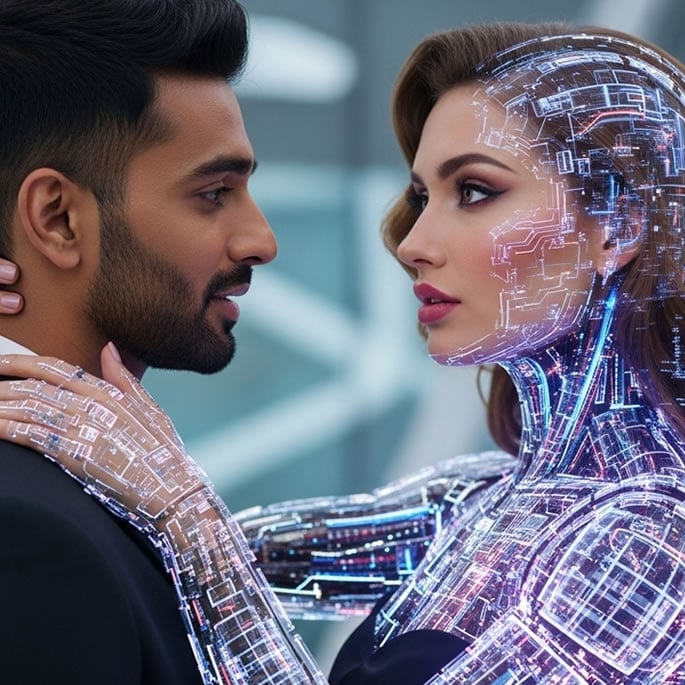“AI dating is very new for us."
Artificial intelligence is rapidly reshaping how people form relationships, and nowhere is that more evident than in the rise of AI girlfriends.
Across a growing number of adult dating websites, users can now create hyper-realistic virtual partners who flirt, send explicit images, and engage in emotional or sexual conversations.
What was once science fiction has evolved into a lucrative digital industry, raising profound questions about intimacy, ethics, and gender representation in an era where technology simulates affection.
The boom has attracted attention beyond tech circles, with discussions at the recent TES adult industry conference in Prague signalling a new frontier in how human desire interacts with artificial intelligence.
Yet behind the allure of endless companionship lies a deeper debate about exploitation, consent, and the social consequences of treating intimacy as a product.
A Growing Market

The commercial appeal of AI companionship has grown sharply.
At the Prague conference, delegates reported a surge in new platforms offering customisable digital partners.
Users can pay monthly fees or buy tokens to interact with AI-generated women who will flirt, undress, or perform sexual acts on command.
According to some developers, these systems eliminate the exploitation seen in some webcam or adult entertainment sectors.
Steve Jones, who runs an AI porn site, asked: “Do you prefer your porn with a lot of abuse and human trafficking, or would you rather talk to an AI?
“You’ll never have a human trafficked AI girl.
“You’ll never have a girl who is forced or coerced into a sex scene that she’s so humiliated by that she ends up killing herself. AI doesn’t get humiliated, it’s not going to kill itself.”
However, critics note that many of these AI companions reflect narrow and often troubling ideals of femininity.
On several websites, users can choose from pre-made models, typically young, white, and smiling, or design their own “perfect” partner.
Profession options include film star, yoga teacher, and lawyer, while personality presets range from “submissive” to “caregiver”.
Age, body type, and ethnicity can be modified to the user’s liking.
Campaigners for women’s rights warn that this level of control perpetuates stereotypes rather than challenging them.
In her book The New Age of Sexism, Laura Bates observes that AI companions are “programmed to be nice and pliant and subservient and tell you what you want to hear”.
Such design choices reveal how technology can reinforce social hierarchies rather than dismantle them.
The Technology Behind Intimacy

The rise of AI girlfriends is fuelled by rapid advances in large language models and image generation.
Chatbots now simulate convincing emotional exchanges, while generative AI creates increasingly lifelike visuals.
Most platforms currently rely on text and still images, but video content is expanding. For many users, particularly men aged 18 to 24, the experience combines gaming culture with digital intimacy.
Alina Mitt, a platform offering what it calls “ai-lationships”, said:
“AI products are appearing like mushrooms. It’s super dynamic right now – they appear, they burn out and they’re replaced by another 10.”
Describing the competition as intense, she added: “You need to be brave and strong to stay in this market. It’s like a bloody war.”
Some companies are now licensing the likenesses of real adult performers to create AI “twins”, giving creators a way to earn revenue without physical labour.
Daniel Keating, who runs a site offering AI-generated partners, said his company focuses on improving realism:
“A good-quality AI girlfriend incorporates natural skin textures, bumps, imperfections, moles, freckles, slight asymmetries that appear much more natural.”
Yet even as realism improves, ethical and technical questions persist.
Developers at the Prague event discussed moderation systems designed to prevent illegal material, such as AI-generated child sexual abuse imagery.
Some sites claim to block keywords like “kid” or “little sister”, but others still allow users to dress their AI companions in school uniforms. The tension between innovation and regulation remains unresolved.
What is the Social Cost?

The ethical discussion around AI girlfriends extends far beyond the adult industry. Many experts worry about how these simulated interactions could reshape human expectations of real-world intimacy.
An advertising executive at dating site Ashley Madison admitted unease about the new competition.
She told The Guardian: “AI dating is very new for us.
“How do we deal with competitors which allow you to build your own fantasy rather than having a real connection with a woman?”
This ability to design an idealised partner raises psychological and social concerns. If relationships with AI are built entirely on fantasy, users may struggle with genuine human connections.
As one employee of Candy.ai explained: “If you want more adult-type relationships, like porn, we have this content.
“Or if you prefer to have deep conversations, that’s there as well. It really depends on what the user needs.”
For critics, that flexibility could deepen societal divides.
Studies have long shown how exposure to unrealistic sexual imagery can distort perceptions of consent and behaviour.
Engaging with AI girlfriends, even though they are not real, may reinforce patterns of objectification.
Women could face new pressures to compete with artificial versions of desirability – perfectly responsive and endlessly available.
Steve Jones argues otherwise: “It’s not replacing going out on a date and getting a girlfriend or having a lover, wife or a relationship. AI is a good place to let younger people practise their social skills.
“People will say things to an AI that would be abusive if they said them to a real person. Like: ‘Hey, stupid s**t, what’s up?’
“In a fantasy role-playing game, people like to be different than how they are in the real world.”
That detachment may seem harmless, but it raises difficult questions.
When abuse or objectification is normalised in digital spaces, it can bleed into offline attitudes.
The technology may not feel pain or humiliation but the cultures it shapes will have very real consequences.
AI girlfriends represent a convergence of technology, desire, and commerce; a mirror reflecting society’s values rather than an alternative to human connection.
The industry’s rapid growth suggests that loneliness, convenience, and fantasy are powerful market drivers.
Yet it also reveals how emerging technologies can repackage old problems, from sexism and exploitation to emotional isolation, under the banner of innovation.
Whether these digital partners are viewed as tools for exploration or symbols of alienation, they force society to confront what intimacy means in the age of algorithms.
As artificial intelligence continues to evolve, the challenge will not be stopping the technology, but understanding what it says about us.






























































